Paying Someone To Edit Videos
How to hire a YouTube video editor - Freelance Vs Outsourced Vs Full Time
Working out if you should pay someone else to edit YouTube videos can show just how much editing is actually costing you already.
So have a look at this link when you're ready.
The unseen cost of video editing
Imagine the time you spend on your YouTube channel or business is an iceberg (bet you didn't expect to start with an iceberg / time metaphor but go with it)
The thing about editing is that as far as time is concerned, it's like the unseen part of the iceberg in your business.
No one sees it because it's below the surface but it makes up the vast bulk of the iceberg and holds up the bit that everyone can see , above the surface.
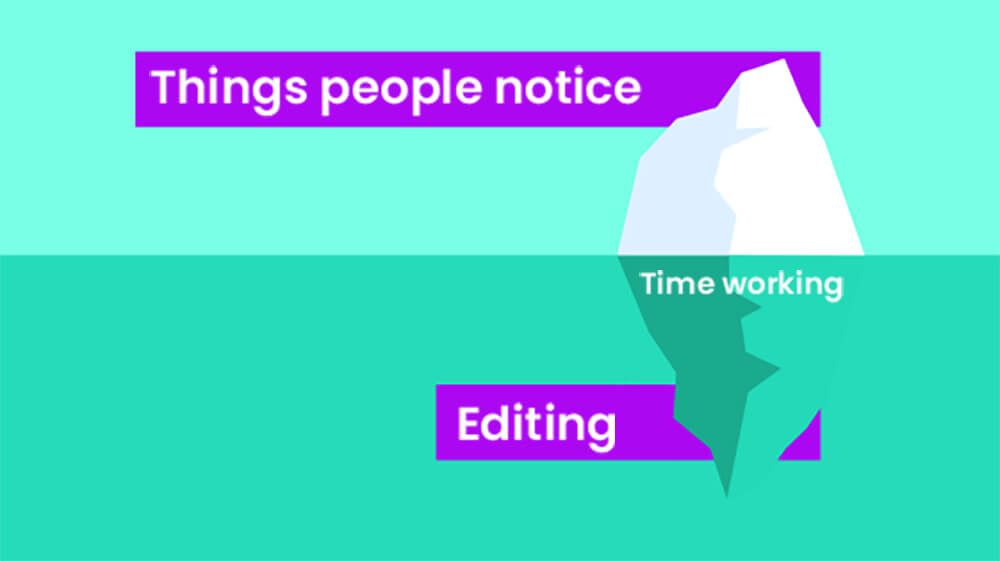
Let's not make any Titanic references, this is a good news blog! You're here because you're considering the option of having someone edit your content for you. That usually means you're growing your channel and business and this article is designed to help navigate the process and make the decision that is exactly right for you.
Types of video editors
Before we go any further though, let's look at some terms here to make sure we're both talking about the same thing when it comes to hiring a video editor for your YouTube videos.
DIY Video editors:
That's you, or someone on your team, editing all your content, whilst trying to do loads of other none editing related things.
Freelance video editor:
Usually (ok, hopefully) a former full time professional that has gone solo with a handful of cherished clients. You could be one of them if you play your cards right. Freelancers of all levels can be found on platforms like Upwork or People per Hour.
Outsourced video editors:
Plenty of video editing companies offer access to a pool of dedicated editors but what they're really selling isn't so much a particular editor but a 'job done' service. If you need more help or less help over time, you just scale up or scale back.
Full time video editor:
You're all in with one editor. As much as you have a dedicated editor that is working only on your projects five days a week, they rely on you alone for a pipeline of work and a salary. That means hiring a full time video editor means payroll paperwork, holiday and sickness pay, pension scheme and tax. But it also means building a team culture and robust capacity.
We wouldn't give up our editor, Greg, for all the tea in China.
What makes a good video editor?
So you might be at a stage right now where you're editing your own videos for YouTube or for marketing and it's taking up a lot of your time.
You might also be thinking that you want to up your quality and suddenly your computer's running slow so you're going to need a new one. Perhaps you want to add some professional music and images, so you'll need a few subscriptions.
Also you may have discovered as many do, that even if your editing is great, it doesn't excite you like all the other aspects of running a channel.
Everyone has a unique set of skills that they can execute quickly and with real flair without getting exhausted by them. They actually love doing it well. At the same time we all know we have skills we can be good at but they take a lot of time.
Then there are some we're merely competent at even if we can do them quickly and finally some there's some that we're frankly rubbish at.
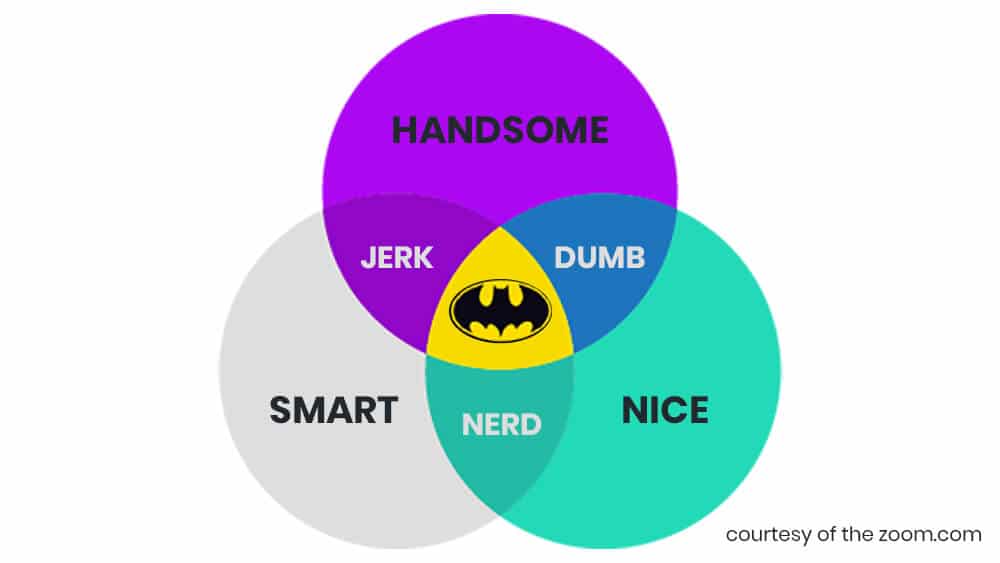
It's more detailed than that of course but basically, if you want to maximise your results in business and life, (ie you want to be Batman rather than a dumb, nerdy jerk), you want to outsource as many things that you don't find enjoyable and that you aren't fast and excellent at also.
This will allow you to concentrate your valuable time on the things that only you do brilliantly.
Ok just kidding. The proper Ikigai is here:
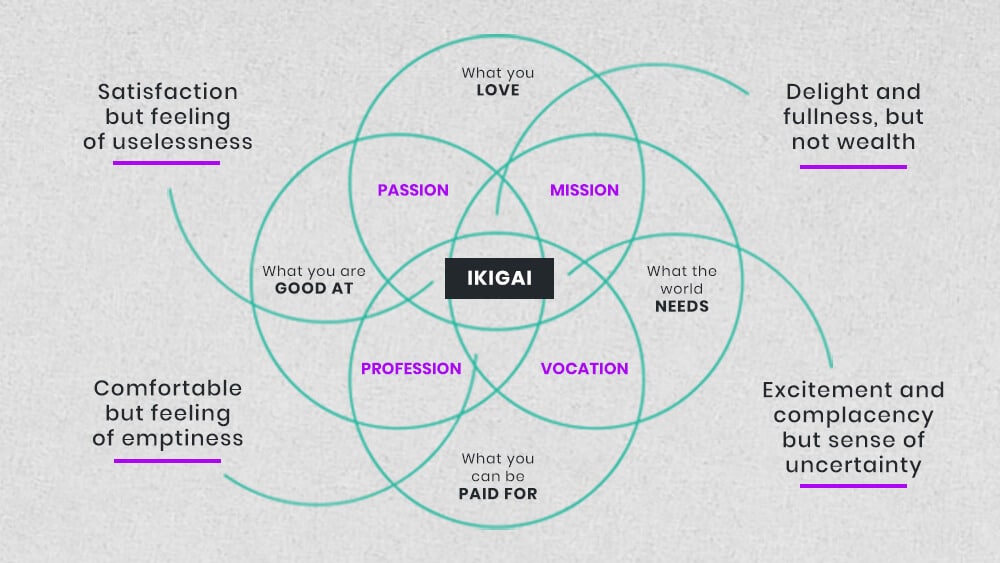
If editing fits into the centre of the above diagram then actually, you might want to consider outsourcing other things in your business!
But if it doesn't, you really must outsource as soon as you can to save your sanity and to get you doing more of the things people value you for.
So with all that in mind, you either stump up a big wad of cash to be able to boost your own work or you find someone else to do it for you.
But do you go for a freelancer, outsource it, or maybe even find someone full time?
Working out if you should pay someone to edit
Working out if you should pay someone else to help you can show just how much editing is actually costing you already.
So have a look at this link when you're ready.
We've built you an editing calculator which will show you just how much money it costs each year to edit everything yourself to a high standard.

Let's say you're editing 2 videos a week right now, so 8 videos a month over the course of a year.
1. Work out how long it takes you to edit a video
And each video is taking 3 hours to do well so set the bar to show this. You'll want to value your time. So you can look at this in two ways:
Option 1: Put in how much you make an hour, or
Option 2: Put in how much you want to make an hour.
If you're growing a YouTube channel or business, you need to seriously consider how much you want to make an hour, because doing tasks that don't help you make this amount of money are stopping you from achieving your goals. Anyway, let's just say this is 50 an hour right now.
2. How much does editing software cost you?
You might have always intended to stick to free editing software but you just want to up the quality you need to go pro, so select from one of the two most common editing options.
3. How much does your tech cost you?
You might already have a beast that's great for editing so you can leave this at zero but you tend to find when people want to take editing more seriously they upgrade, and man that gets expensive.
We're going to leave it at a very conservative 1500, we really wouldn't recommend less than 3,000 though for a powerhouse that lasts a long time.
4. How much do subscriptions cost you?
Shutterstock will give you images, we've said no thanks for now, but we do want access to Soundstripe music tracks and StoryBlocks stock video, so we need to click that to get the cost of a year.
There's other things like hard drives you'd want to add or dropbox etc But we didn't want it to go on forever.
How much video editing actually costs
So this person is spending over 16,000 in their first year editing. Year two would be a bit less because they wouldn't need a computer so 14,000.
If they chose Final Cut Pro X that wouldn't be a cost the second year either, but Adobe would be.
Have a play about with the figures unless we've already convinced that the cost is real.
So now you know how much this costs you, it's time to look at the options out there to see if using them will save you money.
Let's say you hire someone to edit 8 videos a month for you like the example.
If it's less than 16,000 a year you're actually hiring a YouTube video editor for free, in some cases, you might even get it for half the price of doing it yourself.
This is of course presuming you can more easily scale your business by getting more work with the freed up time to do the things people really value you for as discussed earlier. Of course you will – we believe in you!
So let's started on who to hire:

1. An amazing asset
A good freelancer is like nothing else. When you find one, you will not want to let them go, ever.
The value they give you will make them feel cheap. You'll literally fall in love with them… it can get weird, but it's a special feeling.
When you hire a great freelance YouTube video editor, they will go above and beyond the call of duty, will edit on time, quickly, to a very high quality, and advise you to improve your content.
They are right in the middle of the Ikigai Venn diagram from earlier, loving life and doing the thing they know they were made for. They are in the zone just like you will be with your freed up time to make the special sauce only you can make.
So that's the pro number 1, an incredible asset to you.
2. No contract
Although you must remember this is not just something you can bin off without any consequences. This is a person who will rely in part on the income you provide so if you can give a heads up that the work is coming to an end then you really ought to.
There is no long term contract here, no HR, no holiday pay, so freelance editors give you more freedom than a full-time member of staff.
3. Quality
We've touched on this earlier but you'll often find the best freelancers have been editing for years, have a tonne of experience and wanted to leave the limitations of a paid role to earn more and dictate their own lifestyle.
This means you can afford an editor who would be miles outside of your budget otherwise. In other words it's a bargain.
1. Finding a good freelance editor
All of the pros are based around the editor you work with being fantastic. Finding a freelancer who offers this is a totally different ball game.
You can use sites like Upwork where you can put out a job request and people will send you a pitch but be ready to get 50 requests of various different skill sets from all around the world from editors who didn't read your proposal.
Unfortunately, this makes finding the diamond editors harder.
There are lots of sites you can do this on but prepare to add more hours on to your search process and to waste a lot of time with people who might not have told the whole unvarnished truth in their application.
2. Testing & editing workflow
So you've hired your editor and then there's the easing in process. Getting to know each other, building a workflow and then finding out they don't pay for a dropbox subscription will mean that transferring files will be a nightmare. And exactly how will you communicate and leave feedback in a systematised way that isn't an enormous email chain or message board?
A great editor will have this down and all of the systems in place which do cost money. Not having them is a sign that things might be a little tricky at the start, especially if they seem clueless as to how you might work together. That's why the editing software question we suggested earlier is so important.
3. Availability
A great freelancer will be in demand, and you won't be their only client. So when you ask for a job to be finished by next week, and they can't because they are servicing other clients, then you'll have to wait, after all you do not want to lose your amazing freelancer.
Also, because of their excellence they may just outgrow you, get head hunted by a major agency or studio for a months long project or just up their prices out of your league
4. Cost
The best freelancers are expensive. And rightly so, If you can find one that delivers quality, consistency, ease of use, advice, and more for less than 60 or 70 an hour, please let us know in the comments.
They'll work fast, so a video that takes you 4 hours only might take them 2 and they'll do it to a much higher quality than you can so if we put that in the calculator then we can see 8 videos a month for a year will cost you about 13,000 a year. So you're making almost 3k saving there.
Providing you find an amazing one.
Using Upwork as an example, here's how you can separate the novices from the professionals and narrow it down, presuming your aim is to avoid cheap and cheerful, because – have we mentioned? – you will get a lot of applicants.
1 – Have your applicants list the editing software they work on.
It should be Final Cut Pro X, Adobe Premiere Pro or Avid. I'm going to add Da Vinci Resolve in here even though it's a free editing software because any editor using it will know a thing or two about colour grading which is a sure sign they care about the craft. Anything else is still possible but you'd need to be really impressed by their editing sample to proceed.
Alarm bells should be ringing if an editor is working on iMovie, Windows Movie Maker, Filmora or Shotcut (Shotcut is a brilliant free editor BTW but it doesn't have the speed or range of a pro set up). Also this question can double as a chance to filter based on the system you work on.
Sharing work
Sharing projects and files between the same editing software is much easier than otherwise so if, heaven forbid, there's any gaps that you need to fill when your freelancer is away or busy, you can still pick up where she left off.
If you didn't already know, most systems can share XML shell files of projects even with other software but what they can't share is specialised transitions and plugin effects that you don't own.
So a five minute re-edit for a scheduled post to change some overlaid text could easily become an expensive 2 hour epic if you're needing to track down or replace all the plugins and media files that don't sync with your system.
2. Ask for portfolio
They will all have a portfolio but ask them for a sample that they think is their favourite and best. This will let you in on their world and the style and things that interest them. If that aligns with your channel's tone then great – much better to have an editor who shares your view of the world and your style of storytelling than someone who is trying to wear your shoes for you.
All professional editors will have personality in their best work so find out what it is. This shouldn't be a deal breaker, plenty of editors can adopt various styles but with so many options, you may as well work with those that want to work on your content and with you.
3 – Make a job post that will help to attract the best in the first place.
Step one: The video title
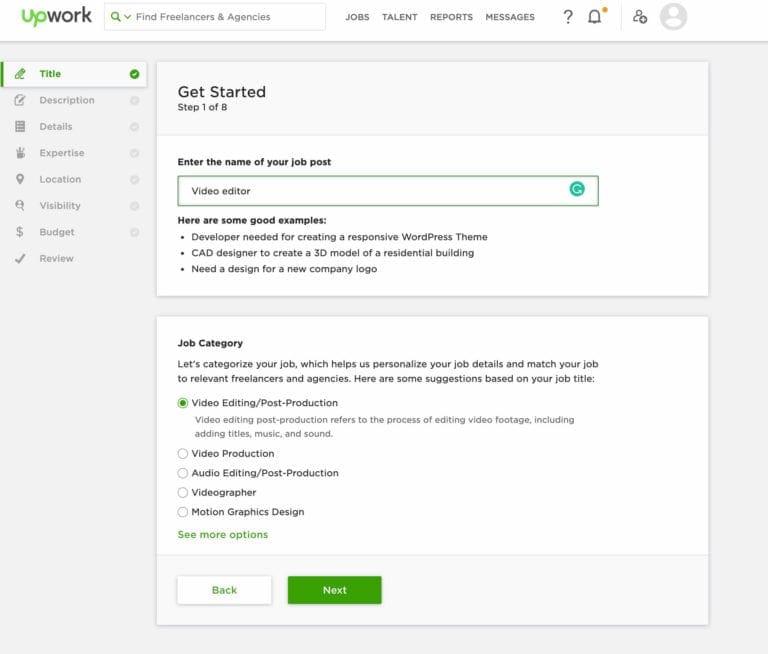
On the first page you need to create the name of your job post.
You'll notice that if you put in the key term (in this case 'video editor'), Upwork's intuitive database will populate job categories at the bottom for you to pick from. This should tell you how important it is to have the key term in the job post name!
But once you've added the job category, go ahead and make the name of the job post more focused.
A title like: 'Video editor needed on Youtube channel for lifestyle themed talking head vlogs' is more helpful than just 'Video editor.'
Step two: Video description
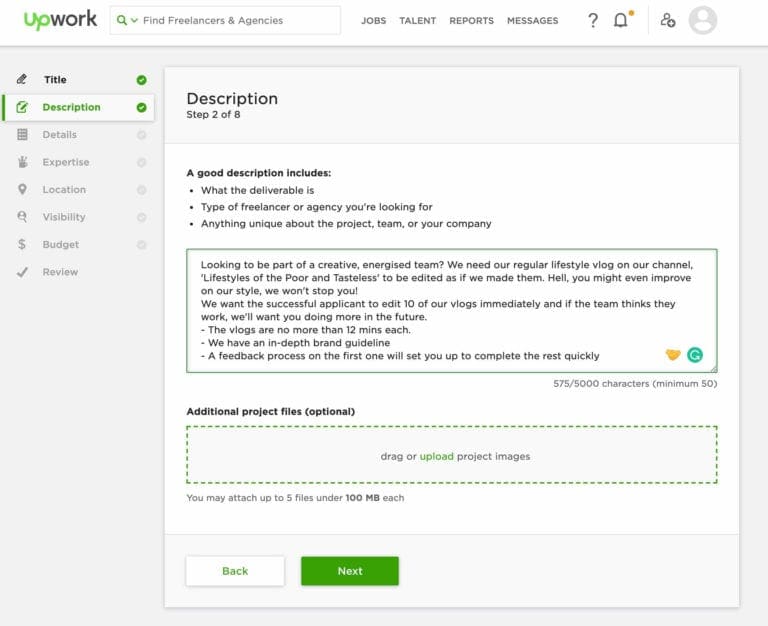
On the next page, complete the description. Possibly the most important bit.
Ok, no it IS the most important bit.
This isn't just a place to state what you need. It also creates a first impression of your organisation. Is your organisation a serious and prestigious place?
Then don't write your description in the tone we have in this example!
Let your potential editor inside on more than just the first project.
Use the terminology you expect them to understand and then make sure you also offer clear and honest objectives and expectations as well as links to previous episodes or projects you want them to use as a guide.
Top freelancers are looking for details and clues as to who they'll be working for and for any missing information that might suggest unforeseen problems. Show them who you are, give them any details you think need solving.
They are suspicious of short descriptions the same as you would be if someone was paying you above the market rate to 'just clean a single window''.
Recommendations for your description
- Explain your project and the deliverable(s)
- Describe the type of skills the freelancer you're looking for should have (i.e. skill level, type of experience)
- Highlight anything that's unique about the project or team
- Examples that help illustrate what you're looking for
- A document with more detailed project/deliverable requirements
- A style guide or similar reference documentation
- Inspiration or ideas, such as a concept or mood board
Step three: The details
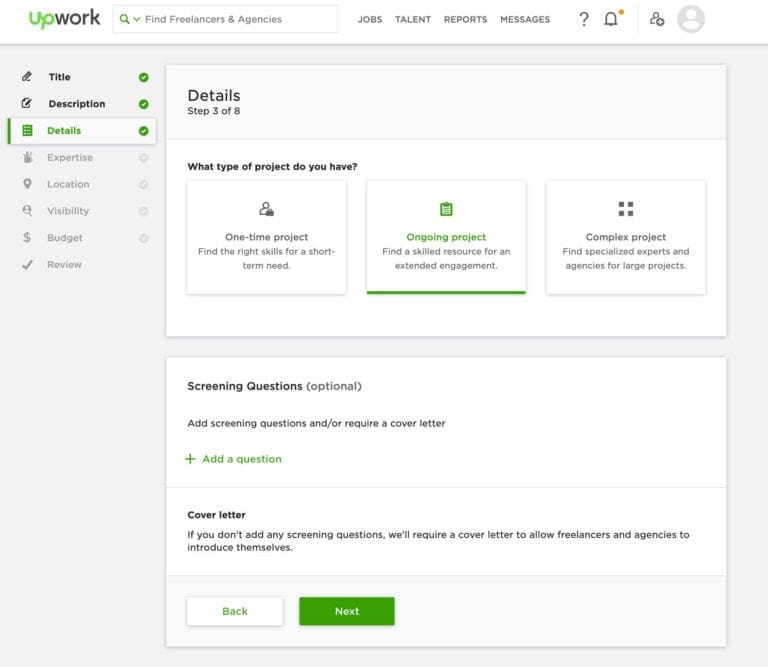
Unless you're planning on hiding the fact you want an ongoing relationship with an editor, you should pick 'Ongoing Project'.
The 'Screening Questions' is where you can enter the information we suggested earlier. You can either answer their tick box prepared questions or create your own. We recommend you create your own and ask what software they edit on and then make a separate one to ask what their favourite editing sample is from their portfolio and why.
When you've added your questions, you have a tick box appear as to whether or not your freelancer needs to write you a cover letter.
Leave the tick box on 'Yes' so that you do get one.
Step four: Expertise
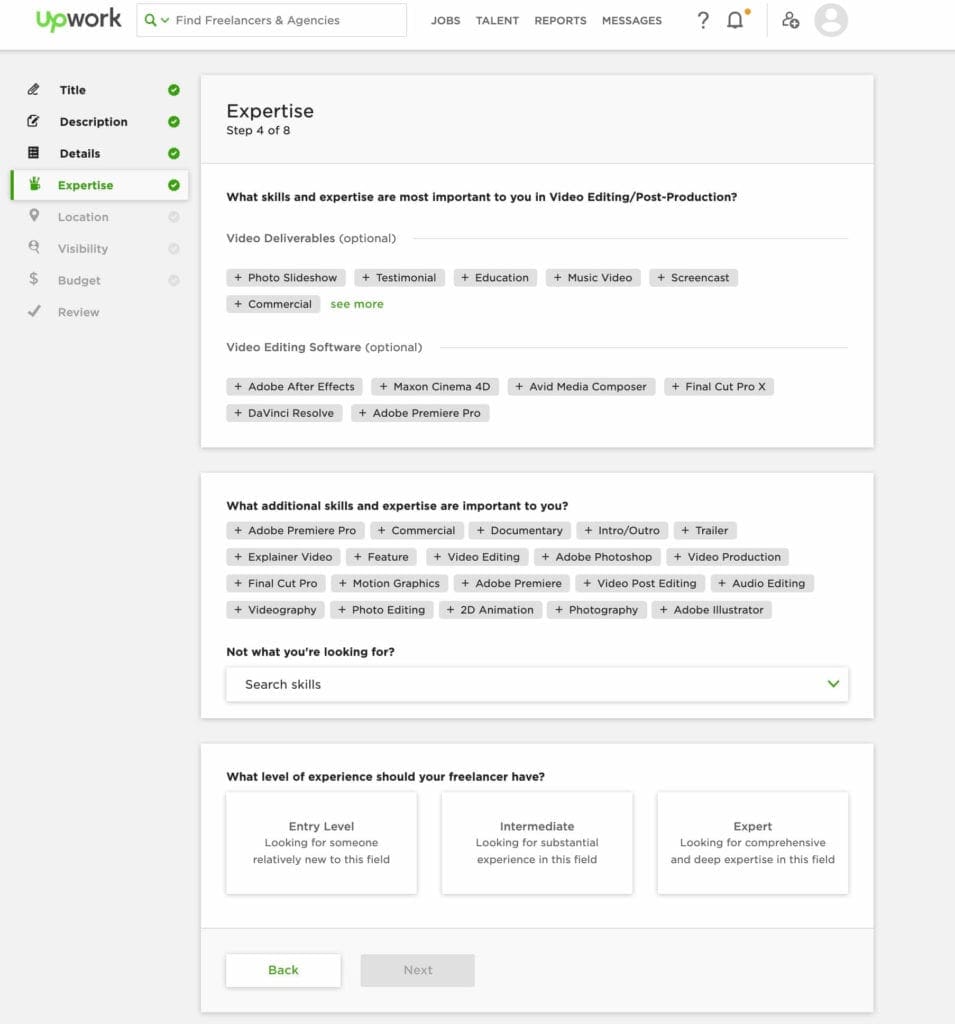
You may or may not need the video deliverables and because you've already asked what software they edit on (notice we're not giving them the software we prefer because it's a way of filtering and we want them to answer rather than brush over this easily ignored information).
Because of the key terms you've used up to now, Upwork will automatically populate the relevant skills and expertise. Word around town is that two or three skills is the sweet spot: Specific on the essentials without any distracting 'nice to haves'.
Then choose 'expert' and go to the next stage.
Step five: Location
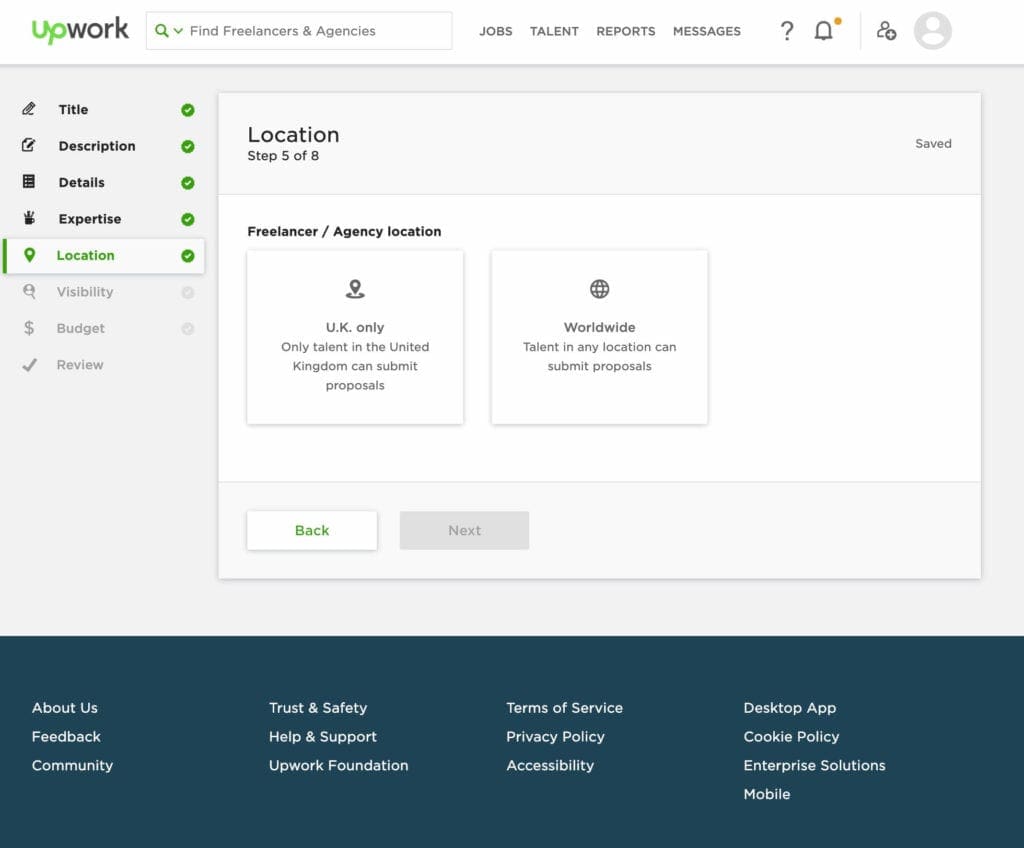
This should be an easy one and it will default to a choice between your location or worldwide.
Our 5 cents is that video editing is a global skill so we've included worldwide in our search in the past with great success.
Also keep in mind that a successful applicant could be in a very different time zone to you. This doesn't pose any problem that can't be solved with an established workflow but something to be aware of.
Would you need to filter to local for cultural reasons? Perhaps your content has a very local tone and vibe which might be hard to grasp for outsiders.
Otherwise, as a filter to cut down the applicant number, this isn't particularly useful. Talent from your nation only is about as useful as filtering YouTube video editors by the colour of their hair.
Step six: Visibility
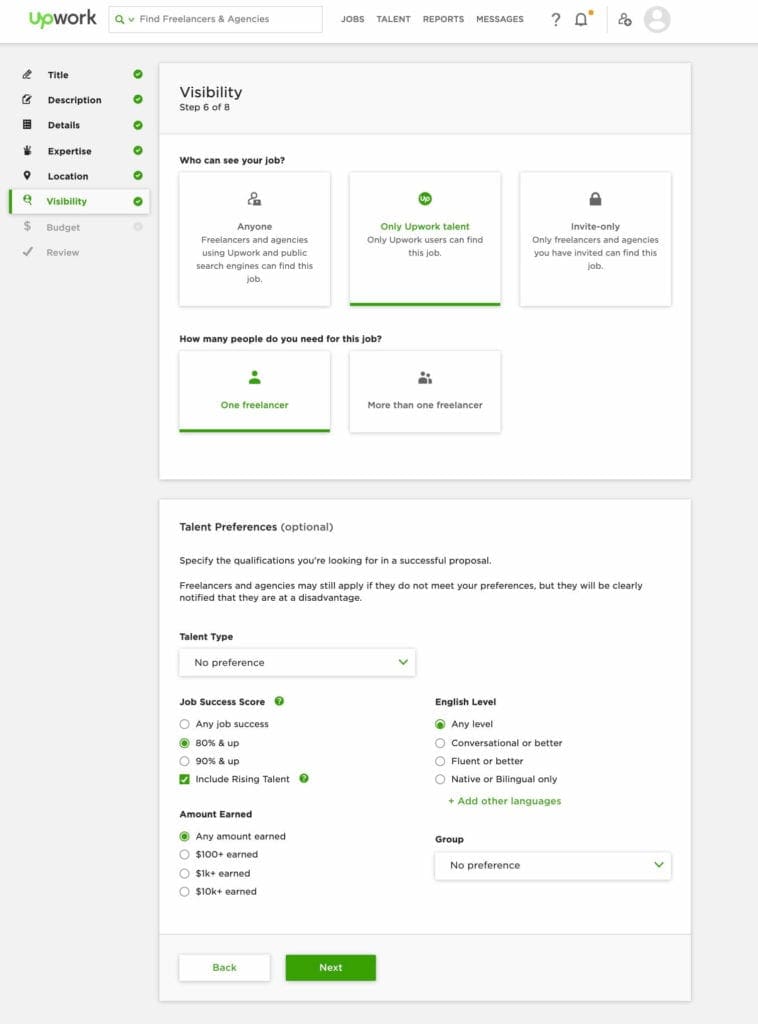
Two things to consider in this section, otherwise go with your own preferences:
1 – The invite only option could keep your search results to a handful of personally selected people. Although this requires some time on your part, you can go headhunting in Upwork and allow applicants by invitation only. This will likely give you a better chance of getting a response from the top talent if they feel they're among a short list already.
If this sounds like too much work, just use the 'Only Upwork talent' selection. There's more than enough talent on Upwork and those finding your proposal publicly are even less likely to read and consider your job post detail before applying.
2 – In the 'Talent Preferences' section, choose 80% & up in the Job Success Score and include Rising Talent. Amount earned can be misleading as the top talent may just dip in and out of Upwork if they are in demand elsewhere.
Step seven: Budget
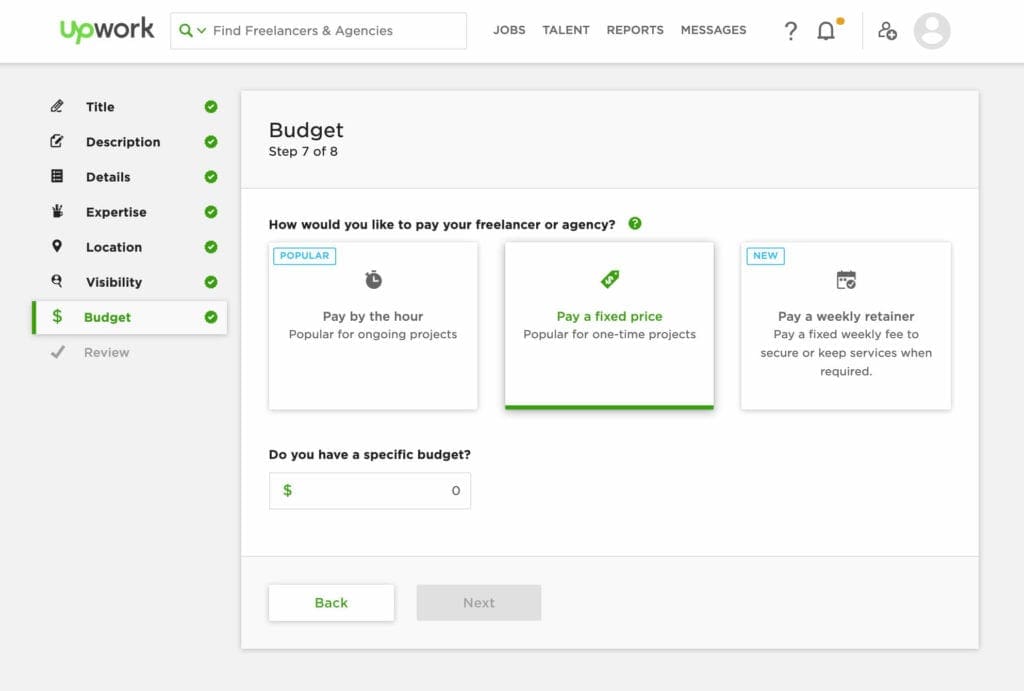
Since this is only your first contact with a potential YouTube video editor freelancer, we'd recommend you use the 'Pay a fixed price' and break some of your editing down to a manageable single project for now.
This will give clarity and set checkpoints for the freelancer as well as allow you to see how they work before going further. Presuming all goes well, you can then move to an hourly or weekly retainer.
I would explain more but Upwork themselves have made a handy little infographic that tells you the differences:
Step eight: Review and post
You're all set! Check through and then post.

The next step is outsourcing to a video editing company.
These are businesses set up to edit at a scale where you send your footage and they edit.
1. Efficient
Editing companies are set up to do just that, edit. They have people editing, so that's the same as a freelancer isn't it? The difference is the editing companies will have people running the business so the editors can do just that: edit. Not get distracted by accounting. Which means they can get very efficient.
You'll also tend to find they have software and systems in place to make submitting and working with your footage very time effective and slick on your side. So you just follow their steps rather than spend days working out your own.
2. Quality
Editing companies will have a quality their editors must hit to be able to represent their brand. So when you reach out to them, you save a lot of time not having to interview stacks of people who might waste your time.
Some of them won't take on editors who don't have at least three years of experience in a professional environment either so you can be rest assured you're in the right hands.
You tend to find that when it comes to editing, quality and speed increase with experience because good editors can second guess potential issues or will know how to fix them without bothering a client.
3. Guarantees
Companies can offer a money-back guarantee, so lets say if in your first month you're not happy with the quality, you've lost nothing. Set up should be fast and efficient too so you shouldn't have even lost that much time either.
A good editing company will communicate a lot with you through your set up to ensure it is as easy as possible to manage.
4. Cover
You tend to find you'll be given a dedicated editor to work with as this is beneficial for the client and the company in getting to know each other's requirements and making them second nature.
But people get ill and also they need holidays! Unlike a freelancer, when this happens, your editing doesn't have to stop as a company will have someone else who can cover for the period. Through using project management tools, they'll easily be able to pick up on the style and quality of your dedicated editor.
5. Other services
Due to the skills of the people on a team, editing companies can offer other services like design work too, often packaged up and included so you can have your video thumbnails or banner ads taken care of for one set cost.
6. Savings
Let's work out how much our person who edits 8 videos a month for themselves would lose or save using an example of an outsourced editing package.
So as we can see they would save over 6,000 a year based on a monthly package of 795 a month. If you edit 12 videos a month, the calculator shows a saving of over 11,000 so its half the price of doing it yourself!!
1. Subscriptions
You might find that some editing companies only work to set subscriptions so if you want them to take care of an odd job here or there, it could get expensive.
It's like a factory, it costs more per unit to make one product compared to 1000 as factories are built on systems that speed up bulk production and make savings over time.
2.Risk
You need to be careful you don't hire a company who's just shipping all of your work out to freelancers around the world or even in the same country. Because if their team isn't full time and dedicated to that company, you'll be having the same problems as hiring a freelancer with your work getting passed around behind the scenes due to disruptions.
If it's imperative your content is never late, the option with the less risk should be one to look at.
3. Too good to be true.
Under promise and over deliver, something businesses should al strive to achieve. If you land on a website and they seem to be promising the world for a price that seems too good to be true, there's a chance it is. You might have gotten lucky, but be sure to do your due diligence so you don't end up with a product that over promises and under-delivers.

1. Scope
You have a full-time editor, that's amazing!! An editor can do so much for your business, and it's all included in a set monthly cost.
You can also develop that editor over time, for smaller businesses and YouTube channels they might be able to help out with some other design work or content ideas too and a new team member is nearly always super valuable as they bring fresh eyes to a project.
2.Timelines
Want to shoot a video and have it edited on the same day? Your full-time editor will be able to handle fast turn around times because you call the shots, they have nobody else to please. You might also find they like filming too so can help there as well.
3.Quality
If you get a good editor, then your quality is going to increase a lot, straight away. They can see your content with fresh eyes and make suggestions for the edit, but often, ways to improve the shoot for the edit.
4. Time
An in-house editor will work way faster than you, so you can produce way more content than you could have done before and it won't be an issue, meaning you can really boost your quantity while increasing quality at the same time.
1. Price
A good editor is going to set you back a lot. You can get a junior editor from around 19000 to 24000 pounds in the UK. These editors will have some experience but looking at the cost calculator, it's the only option that will technically cost you money.
So really a full time editor pays off when you have a lot of content for them to edit. If you were going over 12 videos a month, then you might want to consider this or if you wanted the content made super fast and also to build an in house team for future growth.
2. HR
When you employ someone you take on all the issues of employing someone. You also need to potentially buy all the kit and subscriptions and pay employment taxes, pensions and more and look after their ongoing development.
So a 24,000 spend will look more like 30 by the end of year one.
You also need to stick to employment law and if they slack, you can't just fire them. There's rules and holidays and paid sickness.
So it's a big step which might be a step too far for your needs.
What do you think? Did that help with choosing how to hire an editor?
This is the part where we mention we'll edit videos for you with our outsourced editing service. We tried to remain un-biased because the other options are very good fits for different needs, so we hope this has helped you make your mind up.
Have a look at the amount of content you need to produce, what your ultimate goals are, and either stick to it yourself or look further into one of these options.
Come back to the calculator any time you're looking to number crunch again.
If you want to learn more about editing, treating a YouTube channel like a business or video marketing, then be sure to head on over to our free video marketing course. It'll help you make your own videos as well a promote them.
Table of Contents
Paying Someone To Edit Videos
Source: https://businessfilmbooth.com/how-to-hire-a-video-editor/
Posted by: crossleyhustend.blogspot.com

0 Response to "Paying Someone To Edit Videos"
Post a Comment